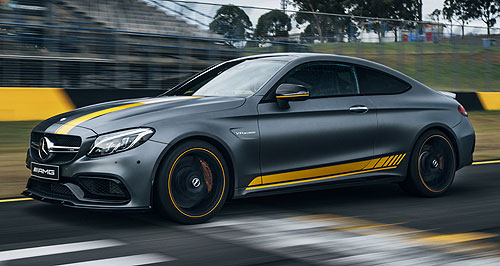Make / Model Search
News - General News - Electric VehiclesGreens call for 50 per cent luxury car tax in EV pushPrice point: The price of a Mercedes-Benz S500 would rise about $26,000 if a Greens proposal to increase the luxury car tax on luxury vehicles above $100,000 comes to pass. Luxury car buyers to fund electric vehicle incentives under Greens policy19 May 2016 THE Australian Greens have proposed funding incentives for electric vehicles by ramping up the luxury car tax (LCT) from 33 per cent to 50 per cent on conventional fossil fuel cars above $100,000. The move – described by luxury car industry executives as a disappointing tax grab – could add tens of thousands of dollars to petrol and diesel high-end luxury cars. For example, a Mercedes-Benz S500 that currently incurs $54,407 in LCT as part of its $315,304 driveaway price, would be subject to an extra $26,000 in LCT, taking the final price above $340,000. In return, the Greens propose a range of subsidies to put an extra 31,000 EVs on Australia roads by 2021. These measures – announced this week by Greens leader Senator Richard Di Natale and Greens transport spokesperson Janet Rice ahead of the July federal election – include subsiding state governments to provide free registration on EVs for the first five years. Other measures include a promise of $151 million to subsidise new charging points, $50 million in subsidies for government and non-government organisation (NGO) fleets to buy EVs, and allowing potential EV manufacturers to dip into the federal government’s Automotive Transformation Scheme. The Greens say the charging point subsidy fund of $151 million would provide grants capped at $45,000 for each charger – sufficient for 3500 new charging points at places such as local council buildings, private car parks and state-owned railway stations. “In time, the market would deliver these services, but this four-year fund will make it easier for people to charge EVs during the early adoption stage of the next few years,” the Greens say in the policy statement. The party estimates its increase to the LCT would earn $280 million over the forward estimates. “Not only would this encourage the purchase of electric vehicles by making the comparative cost of luxury fossil fuel vehicles higher, but it would offset the cost of scrapping registration fees for new EVs,” the party said. But the move has earned the ire of luxury car manufacturers. Mercedes-Benz Australia/Pacific public relations, product and corporate communications senior manager David McCarthy told GoAuto that it was disappointing that the Greens had not consulted with the industry before embarking on its new policy. He said the Greens had previously worked with the industry on policies such as the LCT tax break for cars with fuel consumption below 7.0 litres per 100km – a measure that had changed buyer behaviour and led to reduced CO2 emissions. “Measures such as free registration will mean little to luxury car buyers,” he said. “What we need is meaningful measures. For a start, the luxury tax threshold for cars with emissions below 7.0 litres should immediately be raised to $100,000. “Perhaps we could discuss a new tax break measure for cars with emissions below 5.0 litres. “In think the policy they have announced is a starting point for discussion, but I don’t think it is good policy.” Mr McCarthy said it was unclear from the policy if the 7.0 litre per 100km car tax break would remain or if these cars – mainly diesels and hybrids – would cop the same 50 per cent LCT slug as fossil fuels cars. On July 1, the LCT threshold on luxury cars will move up to $64,132 – an increase of almost $1000 – while for the more thrifty 7.0 litre vehicles, the revised tax will start at $75,526. Mr McCarthy said the LCT was the subject of discussion between the European Union and Australia in their talks for a proposed free-trade agreement. “Within three years, the LCT might be gone anyway,” he said. In Germany, EV buyers get a €4000 ($6000) incentive provided 50/50 by the German government and motor companies. Plug-in hybrid buyers get €3000 ($A4466).  Read more |
Click to shareGeneral News articlesResearch General News Motor industry news |











Facebook Twitter Instagram